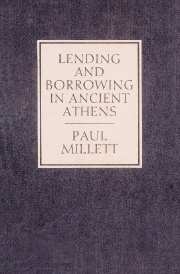Book contents
- Frontmatter
- Contents
- Preface
- I Approaches to lending and borrowing
- II The ideology of lending and borrowing
- III Borrowing and repayment
- IV The rôle of interest
- V Philia and friendship
- VI Non-professional lending: loans without interest
- VII Non-professional lending: loans bearing interest
- VIII Professional money-lending
- IX Conclusion
- Appendices
- Notes
- Bibliography
- Index of passages cited
- Index of papyri
- Index of inscriptions
- General index
VI - Non-professional lending: loans without interest
Published online by Cambridge University Press: 20 August 2009
- Frontmatter
- Contents
- Preface
- I Approaches to lending and borrowing
- II The ideology of lending and borrowing
- III Borrowing and repayment
- IV The rôle of interest
- V Philia and friendship
- VI Non-professional lending: loans without interest
- VII Non-professional lending: loans bearing interest
- VIII Professional money-lending
- IX Conclusion
- Appendices
- Notes
- Bibliography
- Index of passages cited
- Index of papyri
- Index of inscriptions
- General index
Summary
THE TYRANT'S LAMENT
Among Xenophon's slighter works is the Hiero, his entirely imaginary account of a conversation between Hiero, tyrant of Syracuse in the earlier fifth century, and Simonides of Ceos, a poet at his court. The dialogue is contrived to show how, contrary to popular belief, tyrants lead a miserable existence. After some introductory comments, the conversation turns in the direction of philia. Says Hiero (iii.7):
The firmest philiai, I take it, are supposed to be those that unite parents to children, children to parents, brothers to brothers, wives to husbands, and comrades to comrades (hetairois pros hetairous). Now you will find, if you look around, that it is for these private persons (tous idiōtas) most philia is shown (malista philoumenos).
Hiero goes on to complain that tyrants, by contrast, run a considerable risk of being murdered by their nearest and dearest. Whether this really was the case is immaterial. What matters here is Hiero's presentation of his list of ‘firmest philia’ as a hierarchy, with family connexions taking precedence even over hetairoi – the closest of companions.
Three related features distinguish intra-family philia from philia extending outside the family circle. In the first place, philia existed automatically between members of a family and was not generated by performance of a specific action. Secondly, there was no careful calculation of relative advantage in the giving or receiving of goods and services; either this was thought to be inappropriate (or impossible), or there was the assumption that a balance would be struck over time. Finally, family philia was enduring.
- Type
- Chapter
- Information
- Lending and Borrowing in Ancient Athens , pp. 127 - 159Publisher: Cambridge University PressPrint publication year: 1991



